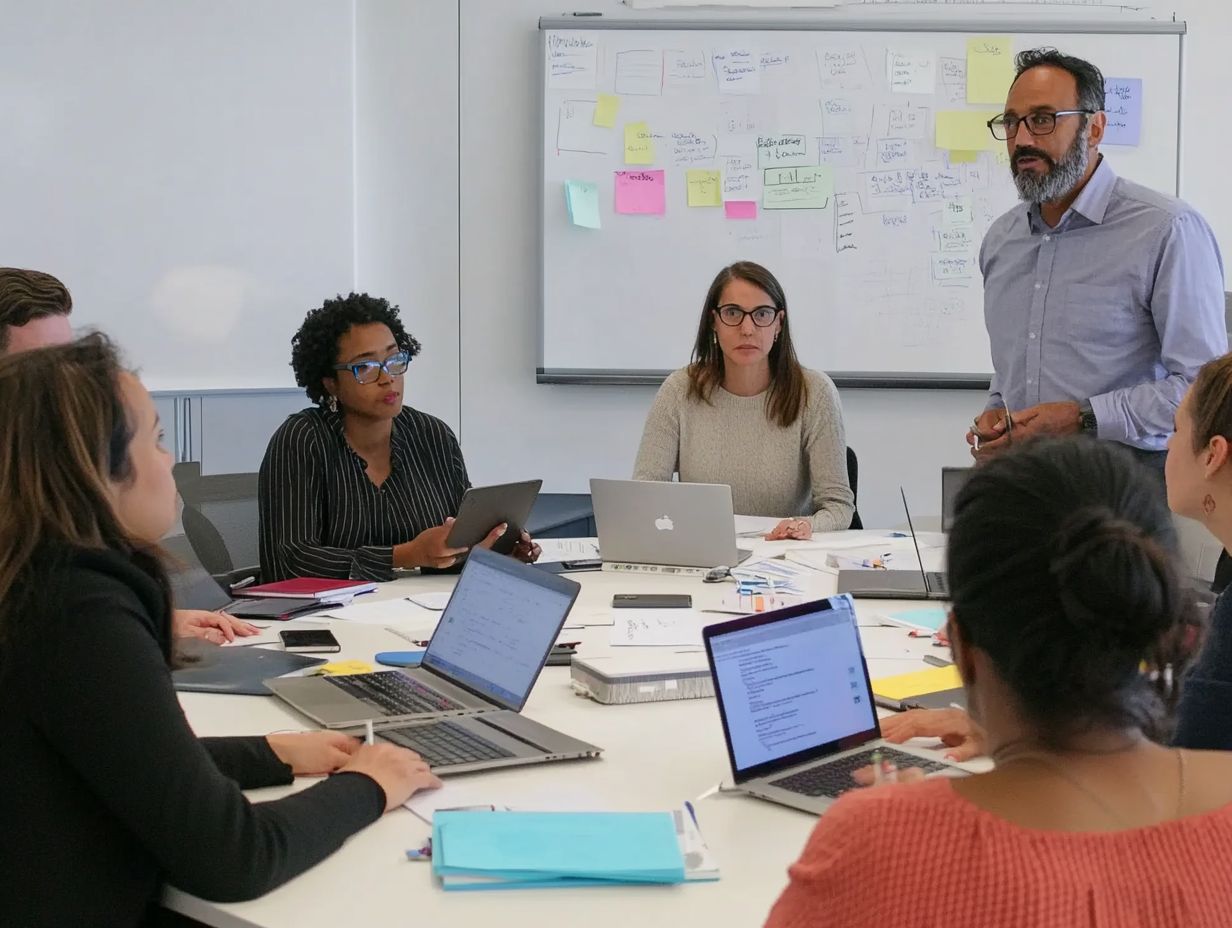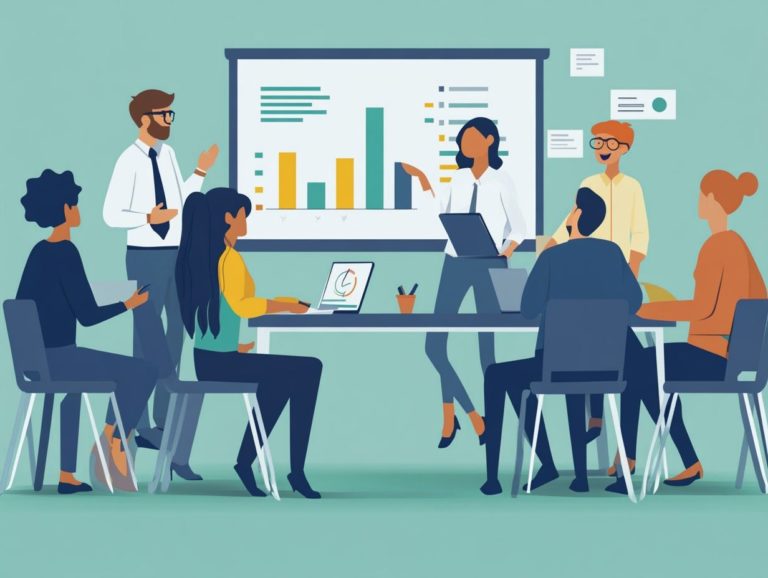Skill Enhancement for Leadership Roles
Effective leadership is a blend of various skills that shape how you inspire and guide your team.
This article explores the key qualities that define strong leadership. These include communication, problem-solving, decision-making, and time management. It also delves into practical ways to enhance these skills through training, mentorship, and self-reflection.
Discover the numerous benefits that come from honing your leadership abilities. These include improved team performance and greater career advancement opportunities.
Jump in now to unleash your full leadership potential!
Contents
- Key Takeaways:
- Key Skills for Effective Leadership
- Ways to Enhance Leadership Skills
- Benefits of Improving Leadership Skills
- Improved Team Performance
- Career Advancement Opportunities
- Frequently Asked Questions
- What does skill enhancement mean for leadership roles?
- Why is skill enhancement important for leadership roles?
- What are some examples of skills that can be enhanced for leadership roles?
- How can one enhance their leadership skills?
- Is skill enhancement for leadership roles an ongoing process?
- Can anyone learn and enhance their skills for leadership roles?
Key Takeaways:

- Effective communication, problem-solving, decision-making, time management, and team management skills are essential for leadership roles.
- Investing in leadership skills benefits both the leader and their team, leading to overall success and growth in the organization.
- Enhance these skills through training, mentorship, and self-reflection to improve team performance and increase career advancement opportunities.
What are Leadership Skills?
Leadership skills include a variety of abilities that enable you to effectively influence and guide others within your team or organization. These skills are essential for fostering employee engagement. They also enhance workplace dynamics and help achieve organizational goals.
Take a look at effective leaders like Tim Cook of Apple Inc.; they exemplify strong communication skills and emotional intelligence. They adeptly navigated the challenges of leadership during the COVID-19 pandemic to cultivate an environment rich in collaboration and support.
Critical thinking is paramount for you as a leader, especially when facing complex decisions that impact your team and organization. Renowned figures in tech, such as Steve Jobs, embodied this trait. They consistently challenged the status quo and drove innovation at Apple.
Building relationships is another vital leadership quality that fosters trust and loyalty among team members. Strong leaders like you recognize that nurturing positive relationships boosts motivation and enhances overall productivity.
By embodying these attributes, you create a thriving workplace culture that ultimately leads to sustainable success.
Key Skills for Effective Leadership
To become an effective leader, you must master a range of essential skills that elevate your interactions with team members and propel performance towards achieving organizational goals.
Skills like communication, problem-solving, and decision-making form the bedrock of innovative leadership. They enable you to foster a culture of motivation and engagement among your employees.
Communication Skills
Communication skills are essential for effective leadership. They allow you to convey messages clearly while mastering the art of active listening. Active listening means fully concentrating, understanding, and responding thoughtfully to what someone is saying. When you embrace effective communication, you cultivate an atmosphere of trust, openness, and collaboration, dramatically boosting employee engagement.
In today’s fast-paced work environments, honing your ability to actively listen and establish structured feedback mechanisms can significantly enhance team performance and workplace relationships. For example, a tech company that implemented regular one-on-one check-ins encouraged employees to voice their concerns and suggestions. They not only elevated morale but also saw a remarkable 20% increase in productivity.
When you practice active listening techniques like summarizing what s been said or asking clarifying questions you create a feedback loop. This enables your team members to contribute in meaningful ways. This approach clarifies expectations and fosters a culture where everyone feels valued and understood.
Problem-Solving Skills
Problem-solving skills are crucial for you as a leader. They enable you to navigate challenges and craft innovative strategies that enhance your team’s performance.
Effective leaders like you harness critical thinking to analyze situations and cultivate a culture of creativity and collaboration among team members.
By using techniques like the Five Whys or root cause analysis, you can dig deeper into issues. This approach helps you pinpoint their origins and leads to more effective solutions.
For example, consider a technology company grappling with recurring software bugs. By implementing a team from different departments to assess the problem, they not only resolved the technical issues but also improved interdepartmental communication.
This collaborative effort shows how diverse perspectives can boost problem-solving. When you prioritize open dialogue, your team can contribute ideas, fostering an environment where innovative solutions can flourish.
Decision-Making Skills

Strong decision-making skills allow you to make informed choices quickly. This drives team performance and shapes your organization’s direction.
You can use frameworks like the DECIDE model to guide your decision-making process. This model involves defining the problem and exploring alternatives while considering the consequences.
Your negotiation skills are crucial, allowing you to foster collaboration among diverse stakeholders and adapt plans as new insights emerge. Take, for instance, a budget cut scenario; effective negotiation can help you align varying departmental priorities, paving the way for a unified approach that ultimately enhances organizational resilience.
Time Management Skills
Effective time management is essential for your success as a leader. It helps you prioritize tasks and set measurable goals, ensuring timely project execution.
By employing strategies like the Eisenhower Matrix, which helps you distinguish between urgent and important tasks, you can direct your efforts where they truly matter.
Practicing the Pomodoro Technique can also enhance your concentration and prevent burnout.
With strong self-discipline, you ll be well-equipped to define clear objectives and stick to deadlines, keeping your team motivated and accountable.
The synergy between effective goal setting and disciplined time management creates an environment where both individual and collective aspirations can thrive, ultimately propelling progress and innovation within your organization.
Team Management Skills
Team management skills are vital for creating a productive work environment. They help with employee recognition and nurturing strong workplace relationships.
By employing strategies like regular feedback sessions and celebrating individual achievements, you can make your employees feel valued. Monthly recognition ceremonies or giving shout-outs during team meetings can uplift morale significantly.
One-on-one check-ins can help you build trust and open lines of communication, allowing for a deeper understanding of each employee’s aspirations and challenges.
Companies like Google have successfully integrated these practices, demonstrating that when team members feel acknowledged and connected, their productivity and loyalty to the organization flourish.
This illustrates the profound impact effective team management can have on your workplace.
Ways to Enhance Leadership Skills
Enhancing your leadership skills is a continuous journey enriched by various training and development opportunities, mentorship programs, and self-reflection practices. These approaches foster personal growth and help you adapt to the ever-evolving dynamics of the workplace.
By enhancing your skills, you drive employee engagement and inspire those around you.
Training and Development Opportunities
Join leadership programs to gain essential tools and knowledge! Engaging in training and development opportunities is vital for leaders seeking to elevate your skills and boost professional growth.
Institutions like Harvard Business School and the Center for Creative Leadership offer programs designed to cultivate vital leadership competencies. These courses often include hands-on experiences like simulations, role-playing, and feedback sessions.
Such experiences provide a richer understanding of team dynamics and decision-making processes. Many organizations also implement mentorship programs that connect emerging leaders with seasoned executives.
This connection enables seamless knowledge transfer and real-time guidance. The blend of structured training and real experience lets you apply what you learn directly to your work, enhancing your ability to lead teams and drive organizational success.
Mentorship and Coaching

Mentorship and coaching are invaluable tools for leaders seeking to refine their skills and foster personal development. Mentors provide insights and guidance that significantly enhance your decision-making abilities and emotional intelligence.
These relationships allow you to develop essential interpersonal skills, like active listening and empathetic communication, both crucial for effective collaboration. This learning process embraces constructive feedback and reflection, cultivating critical thinking skills through real-world problem-solving.
Don t miss out on exploring professional networks, joining industry associations, or seeking connections through social media platforms to discover suitable mentorship opportunities. Once you find a mentor or coach, actively set goals and maintain open communication to elevate the experience.
Self-Reflection and Improvement
Self-reflection is an invaluable asset for you as a leader. It helps evaluate your strengths and weaknesses, pinpointing areas ripe for improvement in your leadership style. Adopting a mindset of lifelong learning fosters continuous growth and adaptability.
Regular self-assessments provide deeper insights into your decision-making processes and emotional intelligence. Practical techniques like journaling, seeking feedback from peers, and using 360-degree feedback can significantly enhance your understanding of your leadership style.
Setting aside dedicated time for critical reflection helps you celebrate accomplishments and provides clarity when facing setbacks. This practice nurtures self-awareness and promotes resilience, ultimately enhancing your executive presence.
As you commit to personal and professional development, you inspire those around you to embark on their own journeys of growth and learning.
Benefits of Improving Leadership Skills
Enhancing your leadership skills brings a wealth of advantages, from boosting team performance to unlocking greater career advancement opportunities. Strong interpersonal skills and emotional intelligence position you to effectively motivate your team and foster engagement.
This elevates collective performance and strengthens your influence as a leader, paving the way for future success.
Take the next steps in your leadership journey today!
Improved Team Performance
Improved team performance stems directly from effective leadership. When you foster a culture of employee motivation and implement enablement strategies, you can significantly elevate team dynamics. Inspiring your team to collaborate and achieve shared objectives is key.
Imagine a tech company flourishing under a participative leadership style. By encouraging team members to voice their ideas and take ownership of projects, the organization experienced a remarkable surge in innovation and productivity. This collaborative environment boosted morale and made employees feel valued and invested in their work.
When you actively support professional development through workshops and mentoring, you cultivate a positive organizational culture that fosters loyalty and reduces turnover. These motivational techniques create an atmosphere in which teams can thrive, driving overall success.
Career Advancement Opportunities
Career advancement opportunities often present themselves to those who exhibit strong leadership skills and navigate complex workplace situations with ease. When you demonstrate skills relevant to your job, you position yourself as a prime candidate for higher leadership roles within your organization.
Research from the Harvard Business Review reveals that a striking 65% of employers identify leadership skills as a crucial factor in promotion evaluations. This statistic underscores the importance of your ability to inspire and motivate a team. It enhances individual performance and cultivates a culture of collaboration and innovation.
Effective leaders empower their organizations to achieve a remarkable 30% uptick in employee engagement, which directly correlates to improved productivity and retention rates. Mastering your leadership skills now can open doors to exciting opportunities tomorrow!
Frequently Asked Questions

What does skill enhancement mean for leadership roles?
Skill enhancement for leadership roles refers to improving and developing the necessary skills and abilities required to effectively lead and manage a team or organization, including insights from skill enhancement for technical roles.
Why is skill enhancement important for leadership roles?
Skill enhancement is important for leadership roles because it allows individuals to become more effective and efficient leaders. This leads to better decision-making, improved team dynamics, and greater success in achieving organizational goals.
What are some examples of skills that can be enhanced for leadership roles?
Some skills that can be enhanced for leadership roles include communication, problem-solving, conflict resolution, time management, and emotional intelligence.
How can one enhance their leadership skills?
Leadership skills can be enhanced through various methods such as attending leadership development programs, seeking mentorship, practicing self-reflection, seeking feedback, and actively pursuing new opportunities to lead and learn.
Is skill enhancement for leadership roles an ongoing process?
Yes, skill enhancement for leadership roles is an ongoing process. Leadership skills need to be continuously developed and refined to adapt to changing environments and challenges.
Can anyone learn and enhance their skills for leadership roles?
Yes, with dedication and effort, anyone can learn and enhance their skills for leadership roles. Leadership skills are not innate; they can be learned and developed over time through practice and continuous improvement.






